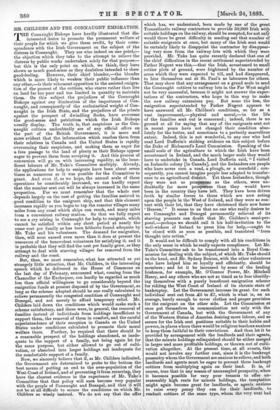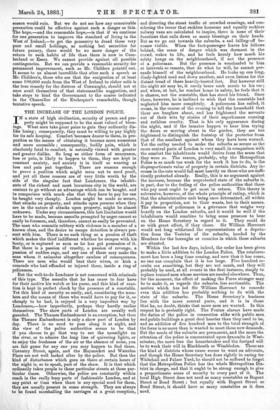MR. CHILDERS AND THE CONNAUGHT EMIGRATION.
THE Connaught Bishops have hardly illustrated that dis- interested desire to promote the permanent welfare of their people for which we give them credit, by their corre- spondence with the Irish Government on the subject of the distress in Connaught. They are wise indeed on one point,— the objection which they take to the attempt to relieve the distress by public works undertaken solely for that purpose— but this is the only point on which, we think, they have shown as much good-sense as they doubtless intended to show good-feeling. However, their chief blunder,—the blunder which is more likely to weaken their public influence than any other,—is their vehement opposition to the assisted emigra- tion of the poorest of the cottiers, who starve rather than live on land far too poor and too limited in quantity to maintain them. On this subject the prejudices of the Connaught Bishops against any diminution of the importance of Con- naught, and consequently•of the ecclesiastical weight of Con- naught in the Irish State, and the prejudices of the priests against the prospect of dwindling flocks, have overcome the good-sense and patriotism which the Irish Bishops usually display. The truth is, that suspicious as the Con- naught cottiers undoubtedly are of any official offers on the part of the British Government, it is more and more evident that the information which reaches them from their relatives in Canada and the United States is rapidly -overcoming their suspicions, and making them as eager for a free passage to the land of plenty as their Bishops appear eager to prevent them from accepting it. And this process of conversion will go on with increasing rapidity, as the bene- ficent labours of Mr. Tuke's Committee multiply. Already, the applications for help to emigrate have been about seven times as numerous as it was possible for the Committee to grant. And even if, as we hope, the annual scale of these operations be considerably increased, we can hardly expect that the number sent out will be always increased in the same proportion. For we must remember that the whole cost -depends largely on the cost of getting the families assisted in -good condition to the emigrant ship, and that this element increases rapidly as you begin to tap the remoter villages many miles from any coast which ships can reach, and many miles from a convenient railway station. So that we fully expect to see a cry arising in Connaught for help to emigrate, which -cannot be satisfied within any short period at nearly the same cost per family as has been hitherto found adequate by Mr. Tuke and his volunteers. The demand for emigration, then, will soon exceed even more than it does at present the -resources of the benevolent volunteers for satisfying it, and it is probable that they will find the cost per family grow, as they attempt to deal with starving villages far removed from the railway and the coast.
Bat, then, we must remember, what has attracted as yet strangely little attention, that Mr. Childers, in the interesting speech which he delivered in the House of Commons on the last day of February, announced what, coming from the Chancellor of the Exchequer, can hardly be regarded as much less than official willingness to go considerably beyond the emigration funds at present disposed of by the Government, so long as the scheme adopted should be one really calculated to relieve permanently the congested condition of Connaught and Donegal, and not merely to afford temporary relief. Mr. Childers laid down the conditions which would make such a scheme satisfactory, and these were, in general, the removal of families instead of individuals from holdings insufficient to support them, the removal of them in comfort, and the careful superintendence of their reception in Canada or the United States under conditions calculated to promote their moral welfare there. Further, he required that there should be .a reasonable prospect of the holdings abandoned, as inade- quate to the support of a family, not being again let for the same purpose, but either allowed to go out of culti- vation, or absorbed into larger holdings not inadequate for the comfortable support of a family. Now, we sincerely believe that if, as Mr. Childers indicated, the Government are determined to probe to the bottom the best means of putting an end to the over-population of the West Coast of Ireland, and of preventing it from recurring, they have the clearest evidence in the experience of Mr. Tuke's Committee that that policy will soon become very popular with the people of Connaught and Donegal, and that it will not be at all difficult to secure the conditions on which Mr. Childers so wisely insisted. We do not say that the offer which has, we understand, been made by one of the great Transatlantic railway contractors to provide 50,000 Irish with
suitable holdings on the railway, should be accepted, for not only would there be great difficulty in sending out that number of suitable emigrants at once, but many of the Irish sent would be certainly likely to disappoint the contractor by disappear- ing very soon from the railway lots with which they were provided. Mr. Tuke has quite recently declared that one of the chief difficulties in the recent settlement superintended by Father Nugent was this,—that the Irish, accustomed to small cottier plots of ground, were frightened by the number of acres which they were expected to till, and had disappeared, to hire themselves out at St. Paul's as labourers for others. That may show that any arrangement on a grand scale to send the Connaught cottiers to railway lots in the Far West might not be very successful, because it might not answer the expec- tations of the contractors, who hope in this way to make the new railway extensions pay. But none the less, the emigration superintended by Father Nugent appears to have answered all Mr. Childers's conditions, so far as a vast improvement,— physical and moral,—in the life of the families sent out is concerned ; indeed, there is no ground at all for saying that any of the emigrants sent out in recent years have not changed their condition abso- lutely for the better, and sometimes to a perfectly marvellous extent. Indeed, this is not wonderful, to any one who had read Lord Dufferin's striking evidence on this subject before the Duke of Richmond's Land Commission. Speaking of the small scale of the agriculture to which the Irish have been accustomed in Ireland, and the much larger scale they would have to undertake in Canada, Lord Dufferin said, " I visited an Icelandic colony [in Canada], and the Icelanders are people who have never seen a road, a plough, or a cornfield ; con- sequently, you cannot imagine people less adapted to transfer- ence to an agricultural district. Yet these Icelanders, though they were not so prosperous as the others, were un- doubtedly far more prosperous than they would have been in the country they have left. They have been driven forth by similar forces to those which are now acting upon the people in the West of Ireland, and they were so con- tent with their lot, that they have christened their new home Heaven.' " It seems to us that no one who really desires to see Connaught and Donegal permanently relieved of its starving peasants can doubt that Mr. Childers's semi-pro- posal,—perhaps we should call it his half-invitation to the well-wishers of Ireland to press him for help,—ought to be closed with as soon as possible, and translated "from thought into action."
It would not be difficult to comply with all his conditions in the only sense in which he really expects compliance. Let Mr. Tuke's Committee ask to be transformed into a Royal Com- mission for dealing with the subject, of which Mr. Tuke should be the head, and Mr. Sydney Buxton, with the other volunteers who have helped him so loyally and efficiently, should be members ; and let it be increased by some of the leading Irishmen, for example, Mr. O'Connor Power, Mr. Mitchell Henry, and any others who are not so timid as to fear identify- ing themselves with a purely beneficent emigration scheme for ridding the West Coast of Ireland of its chronic state of bankruptcy. Let the Government increase its grant for each individual sent out from £5 to £7, which is what is, on an average, barely enough to cover clothes and proper provision for the emigrant on the other side. Let the Commission at once put themselves in communication not only with the Government of Canada, but with the Government of any of the Western States of America desiring more labour, and so secure for the Irish sent positions suitable to their habits and powers, in places where there would be religious teachers anxious to keep them faithful to their convictions. And then let it be provided by arrangement with the landlords and their agents, that the minute holdings relinquished should be either merged in larger and more profitable holdings, or thrown out of culti- vation altogether. At the present time, at all events, this would not involve any further cost, since it is the bankrupt peasantry whom the Government are anxious to relieve, and both landlords and agents must be eager to prevent these bankrupt cottiers from multiplying again on their land. It is, of course, true that in any season of unexampled prosperity, when it becomes possible for very poor tenants to offer un- reasonably high rents for minute holdings, the temptation might again become great for landlords, or agents anxious to raise every penny they can for their landlords, to readmit cottiers of the same type, whom the very next bad season would ruin. Bat we do not see how any conceivable precaution could be effective against such a danger as this. The hope,—and the reasonable hope,—is that if we continue for one generation to improve the standard of living in the West of Ireland,—to get the peasantry to dread these very poor and small holdings, as nothing but securities for future penury, there would be no more danger of the return to such habits of life than there is now in Cum- berland or Essex. We cannot provide against all possible contingencies. But we can provide a reasonable security for permanent improvement, such as Mr. Childers pointdd out. It seems to us almost incredible that after such a speech as Mr. Childers's, those who see that the emigration of at least some 100,000 souls from the West of Ireland to richer soils is the true remedy for the distress of Connaught, should not at once avail themselves of that statesmanlike suggestion, and take steps to bind the Government to the course indicated in the Chancellor of the Exchequer's remarkable, though tentative speech.



































 Previous page
Previous page